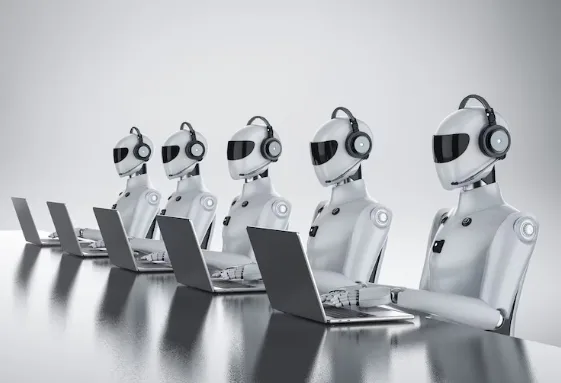The AI threat to white-collar jobs isn’t a distant future, it’s already unfolding, and most people are still asleep.
PARIS, June 15, 2025 — At Vivatech, one of Europe’s biggest tech festivals, Dario Amodei, CEO of AI powerhouse Anthropic, made waves: “ AI could wipe out half of entry-level white‑collar jobs within one to five years.”
But across the hall, the Chief Innovation Officer of global staffing firm ManpowerGroup, Tomas Chamorro‑Premuzic, offered a counterpoint: confident predictions often flop. “If history shows us one thing, it’s that most of these forecasts are wrong,” he said, stressing that AI will reshape, not erase, our work.
AI and White-Collar Jobs: Exposure Doesn’t Mean Elimination
An updated International Labour Organization study finds 25% of jobs worldwide have some exposure to generative AI but “few are at high risk of full automation”. Exposure means certain tasks may change, not that entire roles vanish.
Clerical roles top the list, yet full replacement remains rare. In high-income countries, 9.6% of women’s jobs fall into the most exposed category, nearly three times more than men’s (3.5%) largely because of gender-skewed admin roles (indianf.com, reuters.com).
Will AI Replace White-Collar Tasks or Workers?
Chamorro‑Premuzic warns: “If AI helps knowledge workers save 30–50% of their time, but that time is then wasted on social media, that’s not an increase in net output.” AI can clear time but humans must invest it wisely .
Real-world data backs that up: in a field study, AI tools cut email time by about 3 hours per week but didn’t change meeting habits (arxiv.org).
What Employers Think About AI and White-Collar Jobs
A World Economic Forum survey found 41% of large companies plan layoffs by 2030 due to AI but 77% also plan to reskill existing staff (reddit.com). It’s not just cuts, it’s a workforce evolution.
On Reddit, one user noted:
“AI acceleration will lead to painful but ultimately beneficial transitions… jobs may become ‘human‑in‑the‑loop’” (reddit.com, reddit.com)
Another commented on the dual nature of change:
“Outsourcing is the quiet powerhouse… AI will handle increasing load and only send edge cases to a human.” (reddit.com, reddit.com)
How to Prepare for the Rise of AI in White-Collar Jobs
- Transform, don’t disappear
AI automates repetitive admin tasks but leaves critical thinking, creativity, and emotional labor firmly in human hands (reddit.com, reuters.com). - Reskill or risk irrelevance
IBM estimates 40% of workers need reskilling in the next 3 years. Executives recognize AI as augmenting not replacing their workforce (reddit.com). - Use saved time with purpose
Firms must cultivate a culture that directs AI time savings into innovation, not inbox binging (reddit.com). - Take policy seriously
ILO calls for social dialogue, digital skills investment, and inclusive transition strategy especially to close the gender gap (ilo.org).
Final Verdict
- Will AI “wipe out” 50% of white-collar jobs in five years?
Very unlikely—it’s an attention-grabbing claim, not the reality. - Will AI transform a quarter of jobs?
Absolutely. But it’s more about augmentation than elimination. - Will people need to adapt?
Yes. Understanding AI, adapting workflows, and reskilling will be critical skills in the new workplace.
Conclusion
The narrative that AI will wipe out half of all white-collar jobs is more myth than reality. While automation is rapidly changing how we work—especially in clerical, administrative, and repetitive roles—most jobs will evolve rather than disappear. The real opportunity lies in reskilling, rethinking productivity, and adapting workflows to embrace AI as a collaborative tool rather than a competitor.
For businesses and professionals in Pakistan and beyond, the key takeaway is clear: AI is here to assist, not replace. Those who understand its potential and pivot accordingly will not just survive the shift. they’ll lead it.
FAQ
Will AI really replace half of all office jobs within five years?
No. While some forecasts predict large-scale disruption, most experts—including the ILO—agree that full replacement is unlikely. Instead, job roles will evolve, and new skills will be required.
Which jobs are most exposed to AI automation?
Clerical and administrative roles, particularly those with repetitive tasks, are most exposed. However, most of these roles are expected to be augmented not entirely replaced by AI tools.
How should workers prepare for AI in the workplace?
Workers should focus on reskilling in areas such as digital literacy, critical thinking, communication, and AI-human collaboration. Soft skills and strategic thinking will remain essential.
Is AI expected to create new jobs too?
Yes. While some jobs may disappear, others will be created especially in AI development, AI ethics, data analysis, tech support, and training roles related to AI tools.




